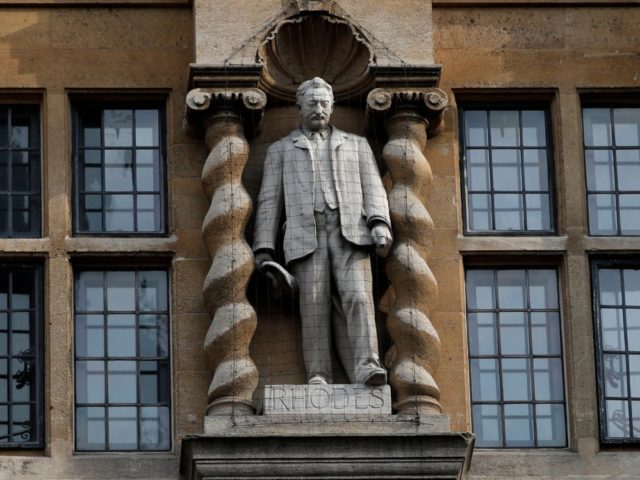Oxford University’s Oriel College has rejected a commission’s recommendation to remove the statue of Cecil Rhodes, the British mining magnate and former prime minister of the Cape Colony.
Far-leftists organising the Rhodes Must Fall Oxford student movement have been agitating for the unpersoning of the Oriel College alumnus and Oxford University benefactor since 2015, with the campaign having gained fresh energy during the Black Lives Matter protests last Summer.
As a result of the protests and the majority of the student body voting to remove the Rhodes statue because of his links to the British Empire, the college commissioned an independent inquiry in June 2020.
In the report seen by The Guardian and reported on Thursday, the commission, headed by Carole Souter, backed the governing body’s initial recommendation to remove the statue from the college building as well as the plaque from King Edward Street.
However, Oriel College responded in a statement the same day that in light of the obstacles of time, cost, and heritage rules on altering listed buildings, “Oriel’s Governing Body has decided not to begin the legal process for relocation of the memorials”.
“Removal of the statue would be subject to legal and planning processes involving the City Council, Historic England and the Secretary of State for Housing, Communities and Local Government,” the report also said.
Following high-profile acts of iconoclasm by the far left during the height of BLM protests, including the violent removal of the statue of Edward Colston in Bristol, Prime Minister Boris Johnson empowered Housing Secretary Robert Jenrick and his ministry with the power to stop Marxist militants from removing pieces of Britain’s material historical culture.
Oriel College continued that it had, however, “recognised the need for a lasting and visible contextualisation of the Rhodes’ legacy” and would “Undertake to contextualise the Rhodes legacy and memorials, including both physical elements at the site and virtual resources” — meaning rather than removal, it would follow government guidelines to “retain and explain”, likely meaning explainer plagues at the sites of the memorials and notes on the college’s website painting Rhodes in a negative light.
But the college did concede to several other demands outlined by the commission, including creating a tutor for “Equality, Diversity and Inclusion”, holding an annual lecture “on a topic related to the Rhodes legacy, race, or colonialism” and having a student prize “on a topic related to Rhodes legacy, race, or colonialism”, and providing more training for staff on “race awareness”.
Vice-Chairman of Policy Exchange’s History Matters project Dr Samir Shah welcomed the decision, saying: “Oriel has rightly decided not to spend time on a fruitless effort to change the past, but to plough resources into trying to change the future, especially for ethnic minority young people.”
Despite the government stating it would intervene to stop the Mao-style Cultural Revolution, many regional bodies have already committed to auditing their material culture for signs of offence, including the Church of England and the London mayoral office, with Sadiq Khan having founded the Orwellian-sounding “Commission for Diversity in the Public Realm”.
According to an analysis by The Guardian, nearly 70 memorials to those alleged to be racist or to have unaceptable connections to the British Empire or slave trading have been removed or changed, including street names, schools, and other public buildings since last summer’s protests by the Marxist BLM movement.



COMMENTS
Please let us know if you're having issues with commenting.